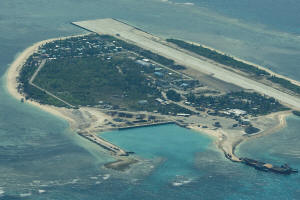|
As
tension mounts over territorial claims in the area, the
Philippine coast guard had early this year spotted a Chinese
navy ship and dozens of militia vessels around the island, one
of nine features Manila occupies in the Spratly archipelago.
Inaugurated on Friday, the new three-storey facility is equipped
with state-of-the art technology such as radar, automatic
identification, satellite communication, and coastal cameras,
the Philippine coast guard said in a statement.
"The behaviour of the Chinese coast guard, People's Liberation
Army (PLA) Navy and Chinese militias are sometimes
unpredictable," Eduardo Ano, the Philippine national security
adviser, said during a visit to the island.
"They do not adhere to the international order, to the rule of
law," he told reporters on Friday.
"What they're describing as gray-zone tactics ... are pure
bullying and it's purely illegal. It's not acceptable in the
international order."
The Chinese embassy in Manila did not immediately respond to a
request for comment.
Manila's outpost of Thitu is its biggest and most strategically
important in the South China Sea, largely claimed by Beijing,
despite conflicting territorial claims by several regional
nations.
Known locally as Pag-asa, Thitu lies about 300 miles (480 km)
west of the Philippine province of Palawan. Home to about 200
people, it is used by Manila to maintain its territorial claim.
Besides the Philippines, Brunei, China, Malaysia, Taiwan and
Vietnam have competing claims of sovereignty in the South China
Sea, a conduit for goods in excess of $3 trillion every year.
(Reporting by Karen Lema and Mikhail Flores; Editing by Clarence
Fernandez)
[© 2023 Thomson Reuters. All rights
reserved.] Copyright 2022 Reuters. All rights reserved. This material may not be published,
broadcast, rewritten or redistributed.
Thompson Reuters is solely responsible for this content.

|
|




